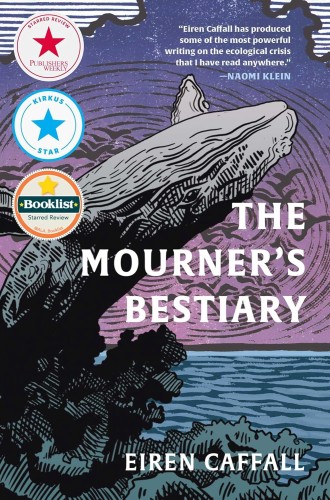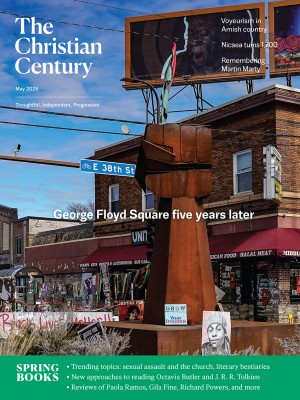The wild earth and its consolations
The Mourner’s Bestiary is part memoir, part illness narrative, and part ecological treatise.

The Mourner’s Bestiary
When Eiren Caffall was diagnosed with polycystic kidney disease in her early 20s, her physician said, “This isn’t what I wanted to be telling you.” The same might be said of Caffall’s new book, which is a song of both praise and lament for the earth. We want to hear a comforting story about how the planet is not really sick and everything will be fine, but that is not the story Caffall has to tell.
Caffall is a writer, singer-songwriter, teacher, environmental activist, and mother. The last item is especially notable because of the difficulty of her decision to have a child. PKD is an inherited kidney disease in which multiple cysts develop in the kidneys and cause bloating, pain, infections, fatigue, and kidney failure. Early mortality is common. Caffall grew up knowing of her vulnerability to the disease because several family members suffered from it and died too young from it. (When the doctor delivered her diagnosis, it was shocking but not exactly surprising.) She faced a dilemma: Should she choose to become a parent and pass along the vulnerability to a child? Her nephrologist told her that he knew how to end PKD in one generation: “People like you should never have children.”
Read our latest issue or browse back issues.
Caffall decides to have a child anyway, noting, “It is easy to tell people that their existence, need, joy, vulnerability, humanity is the driver of collapse. It is harder for the world to change to protect vulnerable lives, human and nonhuman.” From early childhood, her son, Dex, displays a “tunnel focus on animal life,” and his very existence makes it clear that the nephrologist was wrong. Several family members make appearances throughout the narrative, and Caffall honors their complexity, especially when writing about her parents. But Dex, with his fraught biophilia, is the spiritual center of the book.
The Mourner’s Bestiary is about fostering hope in the midst of despair. Despite the grim prognosis she receives from her doctors, Caffall chooses hope—not hope driven by denial, but rather the sort of hope that embraces mourning. Because of her illness, Caffall continually lives the paradox of grieving and hope. She asks us to do the same for the earth. Again and again, she reminds us that the source of our consolation, the wild earth, is also the source of our grief. We immerse ourselves in the wild places we love with the full knowledge that they are imperiled.
Throughout the book, Caffall portrays her family’s illness and their response to it as analogous to the planet’s illness and our response to it. One of the readily recognized stages of grief is denial, she notes, citing Elisabeth Kübler-Ross. Caffall likens the denial of eco-collapse to the denial that is so common in families with PKD: if you don’t think about it, it’s not real. In both cases, she argues, this is no ordinary denial. It runs deeper. Caffall believes we are unable to recognize eco-collapse because we have collectively waved off the evidence in a manner analogous to anosognosia regarding illness. Anosognosia is a clinical condition in which the brain does not recognize the illness or deficit. It’s more of an inability than a choice.
To illustrate the opposite of denial, Caffall cites Dex’s ability to hold his sense of wonder and the reality of extinction together at one time. She challenges her readers to take up a similar stance: to engage actively in mourning while also practicing the spiritual discipline of wonder. Much of the action in The Mourner’s Bestiary takes place near bodies of water, from the Gulf of Maine to Long Island Sound, where Caffall spent her childhood summers.
The spiritual element of this book is ever present but subtle. Caffall mentions that she briefly contemplated going to seminary, but she doesn’t expand upon the point. She cites Rachel Carson’s The Sense of Wonder, and she quotes Rabbi Abraham Joshua Heschel at one point: “Wonder is a state of mind in which nothing is taken for granted.” Indeed, wonder seems to be the primary spiritual practice Caffall promotes. And wonder, as she reminds us, is kin to mourning.
The Mourner’s Bestiary is part memoir, part illness narrative, and part ecological treatise. As Caffall weaves these strands throughout the book, she avoids lingering too long on self-focused reflection and instead points outward. Her ultimate concern is not so much how to live with a chronic illness; rather, it is how to love the world while simultaneously grieving its many ills. “Survivors,” she writes, “whether of genetic illness, or settler colonialism, or class warfare, or systemic racism, or ecosystemic collapse, are not going to stop feeling loss, ever; we are all permanent mourners. I have settled into this truth. I have found it to be the doorway to joy.”





